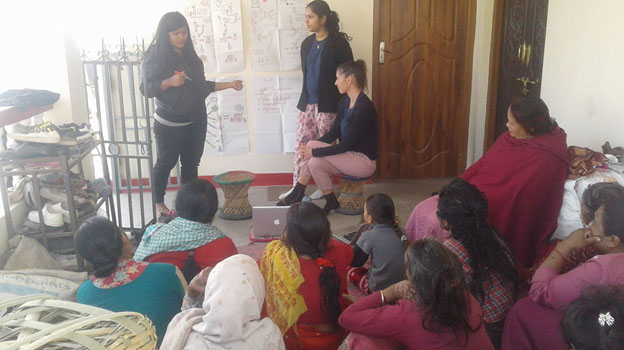Public health and medical care team, 2 international and 2 local health volunteers from Volunteers Initiative Nepal has organized a Infectious diseases and breast cancer awareness campaign in Kavresthali community. International volunteers Rachana and Taryn, local volunteers Debaki and Anjita facilitated the campaign. This breast cancer awareness campaign along with Infectious diseases campaign was focused in 2 wards (4 & 6) in Kavresthali where ward four has seven different communities and ward six has five different communities. They delivered two workshops (1) Diarrhea and Infection Disease Prevention and (2) Breast Cancer Awareness including self -breast exams. There were 15 participants in Karki thok and 12 each in Thumki, Kaure and Thali gaun.
Volunteers were excited about this campaign and they said it was a great experience to organize the campaigns.
“We have done 4 such public health and medical care awareness campaigns so far in the different communities and the women have been very receptive. Most of them knew about the major causes of diarrhea, but we made sure to emphasize the details they might not have known. The community health workers seemed to have a good amount of knowledge about diarrhea and the proper hand washing techniques, along with basics of public health, which is great.
The women seemed to especially appreciate learning more about breast cancer since it seemed like they didn’t have much knowledge about it or how to do the breast exam. Some women were a bit shy to do the exam but we tried to get them to participate and practice it.”
At thumki – All participants were engaged and enthusiastic. They already had good knowledge on hand washing and were able to demonstrate without being prompted. During the brainstorming session the causes of diarrhea suggested by the participants were not eating contaminated food that is rotten or has had flies, not drinking contaminated water and not washing hands. There was not much understanding on food safety apart from covering the food from flies so this may be a good area of focus for that community in future. One of the participants said that her aunt had died of breast cancer. When the women were asked for feedback they would like mobile health camps for breast cancer screening, eye testing etc. in future.
At Karkithok– The participants had heard of one local lady who had suffered from breast cancer and had to get a breast cancer removed and a lady had shared that she had breast pain however had been to the doctor and everything was fine. We emphasized the symptoms of breast cancer and the importance of seeing a doctor if women are unsure. When the women were asked for feedback they would like more health workshops.
At Kaure- A few women were concerned with pain in the breast from working in the field. We told them that this was most likely not breast cancer because it’s generally painless but if they are concerned then they should see a doctor. One woman said that she gets pain right before menstruation. We told her that this is normal for woman during menstruation. The women discussed breast cancer among themselves for a long time during the discussion phase of the presentation and it was great to see that the woman felt comfortable to talk about female issues. When asked for feedback, the women would like more health programs and a health program on cervical cancer.
At Thaligaun- We found out that half of the women treat their water and the other half don’t. The women were asking a lot of questions about breast cancer. We examined the breasts of one lady who wanted us too. She had a scar on her breast, however she said she has had that since birth and everything seemed normal.
It was found that 51 women were benefited from the campaign organized by VIN’s public health team. The campaign was largely effective to disseminate the information about infectious diseases and breast cancer. Moreover women would got the opportunity to learn about the self-breast examinations. Breast cancer awareness campaign has always been one of the major issue in the marginalized communities of Nepal.


 Member of
Member of